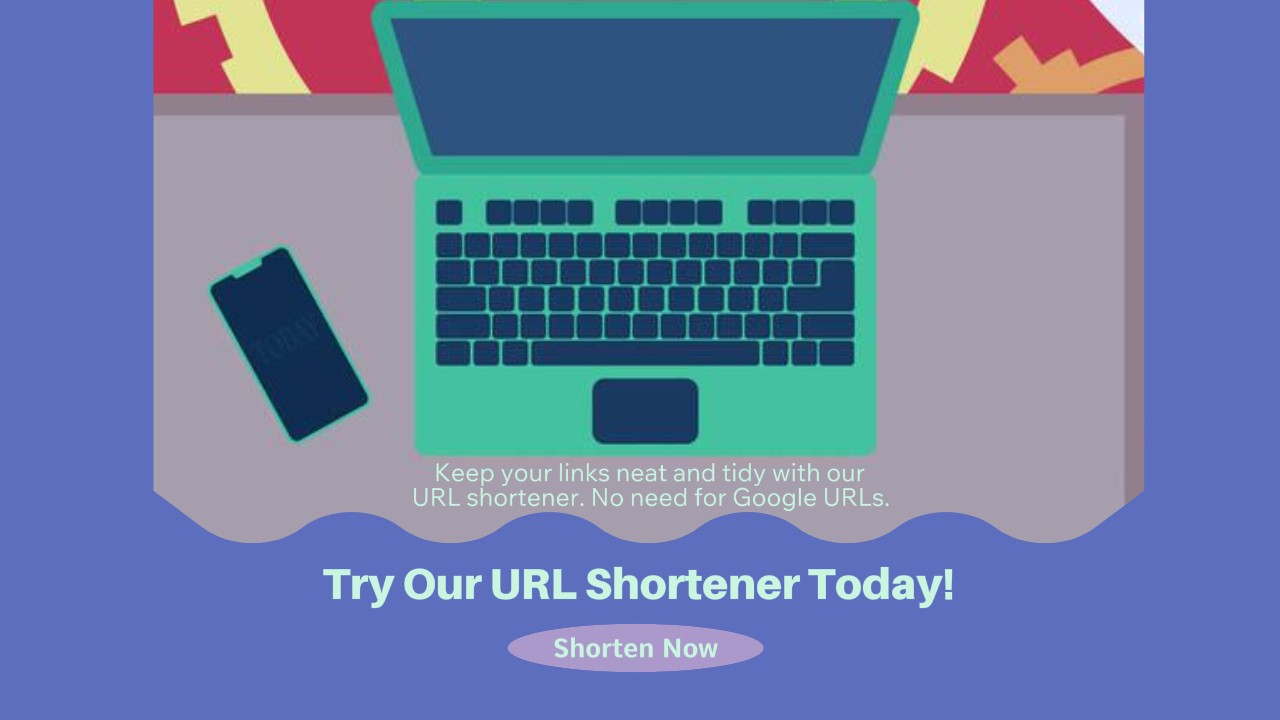Understanding URL Shorteners Online
In this article discuss about URL Shorteners Online . URL shorteners have become an essential tool in the digital landscape, offering numerous benefits for individuals and businesses alike. By transforming long, unwieldy web addresses into concise, manageable links, URL shorteners streamline the sharing process and enhance user experience. This article delves into the intricacies of URL shorteners, their benefits, functionality, and how they have revolutionized online interactions.
What is a URL Shortener?
A URL shortener is a simple online tool that converts a long URL into a shorter version while still directing users to the intended webpage. These tools are particularly useful for social media platforms, email campaigns, and text messages, where space is limited and readability is crucial. For example, a URL like "https://www.example.com/articles/how-to-use-url-shorteners-effectively" can be shortened to "https://urlty.co/abc123".
Shortened URLs are easier to share and can also be used to track the performance of links, providing valuable data on how users interact with content. This makes URL shorteners not only a convenience but also a powerful tool for digital marketers and businesses.
History and Evolution of URL Shorteners
URL shorteners emerged in the early 2000s, coinciding with the rise of social media and microblogging platforms like Twitter, where character limits necessitated shorter links. The first widely known URL shortener, TinyURL, was created in 2002. Since then, many services have entered the market, including Bitly, Google URL Shortener (now discontinued), and URLty. These platforms have continually evolved, incorporating advanced features such as link tracking, analytics, and custom branded URLs.
Early Innovations
The initial innovation of URL shorteners was driven by the need to save space and make URLs more manageable. Early URL shorteners were simple tools with basic functionality, but they quickly gained popularity due to their convenience. TinyURL was among the first to gain widespread use, setting the stage for future developments in the field.
Modern Developments
Today's URL shorteners offer a range of features that go beyond simply shortening links. Modern services like URLty provide detailed analytics, custom branding options, and enhanced security features. These advancements have made URL shorteners a crucial component of digital marketing strategies, enabling businesses to track link performance, enhance brand visibility, and protect users from malicious links.
Benefits of Using URL Shorteners
URL shorteners offer a myriad of benefits, making them indispensable for digital marketing and online communication:
a. Space Saving
Long URLs can be cumbersome and visually unappealing, especially on platforms with character limits. URL shorteners create compact links that are easier to share and integrate into various online mediums. This is particularly beneficial on social media platforms like Twitter, where character limits can restrict the amount of content that can be shared.
b. Improved Click-Through Rates (CTR)
Shortened URLs are more likely to be clicked due to their clean appearance and ease of use. Custom short links can also include brand names, enhancing trust and recognition among users. Studies have shown that branded short links can significantly increase click-through rates compared to generic short links.
c. Enhanced Analytics
Many URL shorteners provide detailed analytics, allowing users to track the performance of their links. Metrics such as click-through rates, geographic location of users, and referral sources help marketers optimize their campaigns. This data can be invaluable for understanding user behavior and making data-driven decisions.
d. Link Management
URL shorteners offer link management features, enabling users to edit, update, or delete links as needed. This flexibility is crucial for maintaining up-to-date and accurate links across various platforms. For example, if a destination URL changes, the shortened link can be updated to reflect the new URL without needing to create a new short link.
e. Security and Privacy
Some URL shorteners include security features to protect users from malicious links. They can detect and block harmful URLs, ensuring a safer browsing experience. This is particularly important for businesses that want to protect their users and maintain trust.
How URL Shorteners Work
Understanding the technical workings of URL shorteners can shed light on their efficiency and functionality. Here’s a simplified breakdown:
a. URL Submission
Users submit a long URL to the shortener service, which then stores the URL in its database. The service assigns a unique identifier to the URL, which is used to generate the shortened link.
b. Link Generation
The service generates a unique, shortened URL, often comprising a domain name and a random or customizable string of characters. This shortened URL is then provided to the user for sharing.
c. Redirection
When users click the shortened URL, they are redirected to the original long URL. This redirection process is quick and seamless, typically involving an HTTP 301 or 302 redirect. The URL shortener service looks up the original URL in its database and redirects the user accordingly.
d. Analytics Collection
During the redirection process, the URL shortener service collects data on the click, such as the time, location, and device used. This data is then made available to the user through the service's analytics dashboard.
Customization and Branding
One of the standout features of modern URL shorteners is the ability to customize and brand short links. Businesses can create branded links that include their company name or a relevant keyword, reinforcing brand identity and trust. For instance, a generic short link like "https://bit.ly/xyz123" can be transformed into "https://urlty.co/YourBrand".
Importance of Branding
Branded short links are more memorable and trustworthy than generic short links. They help reinforce brand identity and can increase click-through rates by making links more recognizable and credible. This is especially important for businesses that want to maintain a consistent brand image across all digital channels.
Customization Options
Many URL shorteners offer a range of customization options, allowing users to choose their own short link format. This can include custom slugs, branded domains, and even QR codes for offline use. Customization options provide flexibility and enable users to create links that align with their brand and marketing goals.
Integrating URL Shorteners with Marketing Strategies
URL shorteners are a powerful tool in digital marketing, enhancing the effectiveness of various campaigns:
a. Social Media Marketing
Short links are ideal for social media posts, where character limits and aesthetic appeal are important. Custom short links can boost engagement and drive traffic to targeted landing pages. They also make it easier to track the performance of social media campaigns by providing detailed analytics on link clicks.
b. Email Marketing
In email campaigns, shortened URLs make emails look cleaner and more professional. They also help track the effectiveness of different campaigns by providing click-through data. Shortened links can be used to track user interactions with email content and measure the success of email marketing efforts.
c. Influencer Marketing
Influencers can use short links to promote products or services, making it easier to share and track referral traffic. Custom links also enhance the credibility of the promoted content. By using branded short links, influencers can create a seamless and trustworthy experience for their followers.
d. Affiliate Marketing
Affiliate marketers can use short links to track clicks and conversions from their marketing efforts. URL shorteners provide detailed analytics that can help affiliates optimize their campaigns and maximize their earnings. Short links also make it easier to share affiliate links across different platforms.
SEO Considerations
While URL shorteners are convenient, they can have implications for SEO. It’s important to use reputable URL shorteners that use 301 redirects, as these are preferred by search engines and ensure that link equity is passed on to the destination URL. Additionally, using branded short links can help maintain SEO benefits while improving click-through rates.
Impact on Search Engine Rankings
Search engines treat 301 redirects as a permanent change, passing most of the link equity from the short link to the destination URL. This means that using a reputable URL shortener with 301 redirects will not negatively impact search engine rankings. However, it's important to avoid using shorteners that use 302 redirects, as these are treated as temporary and may not pass link equity.
Keyword Optimization
Custom short links can include relevant keywords, which can enhance SEO by making links more relevant to search queries. This can help improve the visibility of links in search engine results and drive more organic traffic to the destination URL.
Choosing the Right URL Shortener
With numerous URL shorteners available, selecting the right one can be challenging. Key factors to consider include:
a. Features
Look for URL shorteners that offer advanced features such as link tracking, analytics, and customization options. These features can significantly enhance the effectiveness of your marketing efforts. Some URL shorteners also offer integrations with other marketing tools, providing a seamless workflow.
b. Reliability
Choose a reliable URL shortener with a good reputation and uptime record. Unreliable services can result in broken links and lost traffic. It's important to select a URL shortener that has a proven track record of reliability and performance.
c. Security
Ensure that the URL shortener provides security features to protect users from malicious links. This is crucial for maintaining the trust and safety of your audience. Look for URL shorteners that offer features like link scanning, password protection, and expiration dates for added security.
d. Cost
While many URL shorteners offer free plans, premium plans with advanced features may be more beneficial for businesses. Compare pricing plans to find the best value for your needs. It's important to consider the features and benefits offered by different pricing plans and choose one that aligns with your budget and requirements.
Future of URL Shorteners
As technology continues to advance, the future of URL shorteners looks promising. Integration with emerging technologies such as AI and machine learning could provide even more sophisticated analytics and personalized link management. Additionally, the increasing emphasis on data privacy and security will likely lead to enhanced security features in URL shorteners.
AI and Machine Learning
AI and machine learning have the potential to revolutionize URL shorteners by providing advanced analytics and insights. For example, AI-powered algorithms can analyze user behavior and optimize link performance in real-time. Machine learning can also help detect and prevent malicious links, enhancing the security of URL shorteners.
Data Privacy and Security
With the growing importance of data privacy and security, URL shorteners will continue to evolve to meet these demands. Enhanced security features such as link encryption, two-factor authentication, and GDPR compliance will become standard in the industry. Businesses will need to prioritize data privacy and security to maintain user trust and comply with regulations.
Integration with Marketing Platforms
URL shorteners will increasingly integrate with other marketing platforms and tools, providing a seamless and unified workflow for marketers. This will enable businesses to manage their marketing efforts more efficiently and gain deeper insights into their campaigns. Integrations with platforms like Google Analytics, Facebook Ads, and email marketing tools will become more common.
Conclusion
URL shorteners have transformed the way we share and manage links online, offering a host of benefits from improved click-through rates to detailed analytics. As they continue to evolve, these tools will remain integral to digital marketing and online communication. By understanding their functionality and leveraging their features, businesses and individuals can enhance their online presence and drive more effective campaigns.



